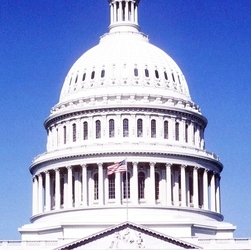 The controversial wind production tax credit (PTC) appears to be gaining momentum during the lame-duck session of Congress.
The controversial wind production tax credit (PTC) appears to be gaining momentum during the lame-duck session of Congress.
Although there is no definitive date for adjournment, the lame-duck session of Congress is projected to run through Dec. 11. However, considering the amount and complexity of issues Congress must decide on, adjournment may be extended to Dec. 18 or later.
Wind advocates, such as the American Wind Energy Association (AWEA), assert that the PTC has been the predominant driver of wind energy development over the past decades. However, during periods of policy uncertainty – when the PTC is up for renewal – the wind energy supply chain grinds to a standstill.
Nonetheless, with a few short weeks remaining in the lame-duck session, time is of the essence to secure an extension of the wind industry's most pressing legislative priority. The PTC, which provides a $0.023 tax credit for every kilowatt-hour of electricity produced by wind energy, was allowed to expire at the end of 2013.
AWEA is hoping that the same playbook used to secure an extension in 2012 – broad, bipartisan support – will again prove successful.
‘The Democrats are pretty much in alignment,’ says Curt Beaulieu, senior counsel at law firm Bracewell & Giuliani. ‘With the Republicans, it's the wind states versus the non-wind states.’
Still, AWEA says that a recent poll suggests that the vast majority of registered voters – Democrats, Republicans and Independents – support the PTC and its extension.
Even some of the PTC's chief critics, such as Thomas Pyle, president at the American Energy Alliance, seem resigned to the incentive's extension.
‘At the very least, the House should revert back to the original "placed in service' language," Pyle writes in a Dec. 2 statement, adding that a one-year extension would be akin to "an early Christmas present."
If an extension is possible – even likely at this point – in what form will the tax incentive emerge from the lame-duck session? Will it be extended for one year? Two years? Or – as has been previously addressed in 2012 – will the tax credit be phased out entirely over time?
According to Beaulieu, not only does a phase-out appear likely, but the notion is also gaining traction on Capitol Hill.
"Permanently extending the PTC is not an option, and ending the PTC entirely is not an option,’ Beaulieu explains. "There is a critical mass who want to phase out the PTC over time."
Under one scenario being floated, the full value of the PTC would remain intact for the remainder of 2014 and 2015. After that, Beaulieu says, the value of the tax credit would fall to 80% in 2016 and 60% in 2017. After 2017, the tax incentive would be completely phased out.
Staggering the end of the credit over time would allow the wind industry time to prepare, Beaulieu notes.
For its part, AWEA continues to advocate for an extension.
"Through 2015 at the very least," notes Peter Kelley, a spokesperson at AWEA, adding that timeframe would provide the needed certainty for the U.S. wind industry to continue its growth.Â
AWEA's preference coincides with the PTC version currently contained in the EXPIRE Act, a tax extenders package that passed the Senate Finance Committee in April. The EXPIRE Act contains about 50 tax breaks that have expired, including the PTC. If passed, the legislation would retroactively extend the PTC through Dec. 31, 2015.
However, in a display of political posturing, the full Senate failed to move the EXPIRE Act forward in May. Following the defeat, Senate Finance Committee Chairman Ron Wyden, D-Ore., pledged to work with Republicans and revive the act.
The PTC, meanwhile, faces a tougher obstacle in the U.S. House of Representatives. While the House did not pass an omnibus extenders package, the chamber did pass several bills to make certain provisions permanent, such as bonus depreciation (H.R.4718) and a five-year recognition period for S corporations (H.R.4453), a pass-through entity created for tax purposes. The wind energy PTC, however, was not among the House's preferred provisions.
Because time is short, both Senate and House tax writing committees recently met to agree on a package deal that would make certain tax provisions permanent, Beaulieu notes. While the package is believed to include some provisions preferred by the House, it is unclear how the wind PTC factored into those discussions.
Just the same, several industry watchers, such as John Marciano, partner at law firm Chadbourne & Parke, anticipate the PTC will ultimately be extended.Â
For his part, Marciano does not expect a PTC phase-out in the lame-duck session. He says there's simply not enough time remaining for Congress to tinker with phasing out the credit. "I'm not sure why they would single out the wind PTC for that, while giving no reduction to bonus depreciation, for example," he says.
Update (Posted Dec. 23):
According to reports, the U.S. House of Representatives is expected to consider tax extenders legislation this week that would extend expired tax credits, including the wind PTC, only through the end of 2014 and likely require Congress to revisit tax reform next year.
AWEA argues that, if passed, the retroactive one-year PTC extension would fall short of what the wind industry needs.
"We call on all clean energy supporters in Congress and the White House to work to pass a two-year extension of these critical tax policies," says Tom Kiernan, CEO of AWEA. "The three-week extension being considered by the House does not provide the certainty and stability needed to keep U.S. factories open and keep workers on the job. And if you think otherwise, try telling that to the American workers who will be laid off starting in January."
"A three-week extension kills jobs and provides businesses little ability to create the jobs we want to create," adds Kiernan.



